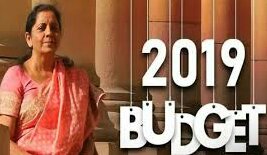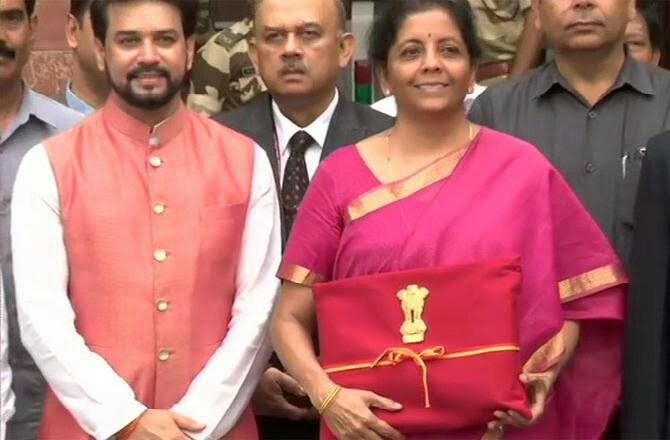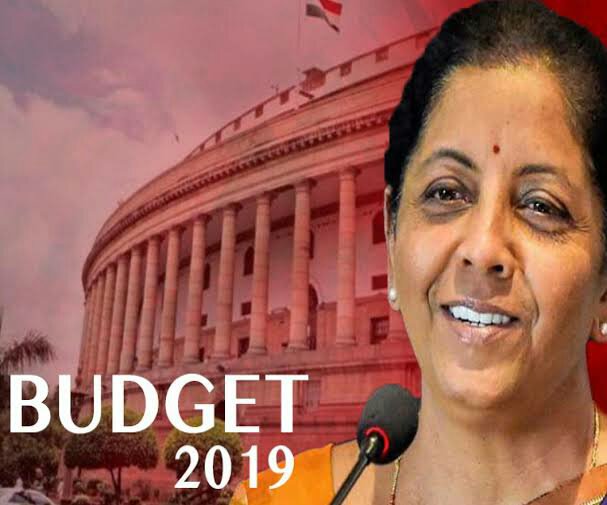by our special correspondent
There has been some aspiration over the budget . But given the way railway budget it was expected that the 2019-2020 budget will hardly see any special flash in this year’s budget . And except for few sparks the budget reflected the BJP government stand to reform and strengthen the key area than to present a populist budget.

After a pre-election, populist Budget in February 2019, the Modi government today presented the Union Budget to boost infrastructure and foreign investment at a time when the economy is showing signs of slowdown. Taking a pragmatic approach, Finance Minister Nirmala Sitharaman today announced no changes in personal income tax rates but levied additional surcharge on the super rich. She also sought to spur growth with reduction in corporate tax and sops to housing sector, startups and electric ve .. Among key announcements, Sitharaman said that digital payments will get cheaper, govt will launch an ATM-like One Nation One Card for pan-India travel and new model rental laws will be unveiled to boost affordable housing.
Finance minister Nirmala Sitharaman hiked tax on petrol and diesel, raised import duty on gold, levied additional surcharge on super rich and brought a tax on high value cash withdrawals as she sought to spur growth with reduction in corporate tax and sops to housing sector, startups and electric vehicles.
Presenting the Union Budget for 2019-20, Sitharaman announced further opening up of aviation, insurance and media sectors to foreign investment while throwing a lifeline to the struggling shadow banks (NBFCs) to boost investment and lending in the economy.

Taxes:
* No change in personal income tax rates
* Custom duty hike on fuel by 1 rupee, gold and precious items; Petrol & diesel to get costlier.
* 3% surcharge on an income of Rs 2 crore; 7% on Rs 5 crore and above.
Taxes:
* No change in personal income tax rates
* Custom duty hike on fuel by 1 rupee, gold and precious items; Petrol & diesel to get costlier.
* 3% surcharge on an income of Rs 2 crore; 7% on Rs 5 crore and above.
Sports:
* To popularise sports at all levels, National Sports Education Board for development of sportspersons to be set up under ‘Khelo India.’
State of the economy:
* Railways will require investment of Rs 50 lakh crore from 2018-30.
* Schemes such as BharatMala, Sagarmala and UDAN are bridging rural urban divide and improving our transport infrastructure.
* ‘Gandhipedia’ is being developed to sensitize the youth about posit ..
The unambiguous mandate by the people in the recent election has set the ball rolling for the New India.
* NPAs recover Rs 4 lakh crore over the last four years, NPAs down by Rs 1 lakh crore in the last one year.
* Rashtriya Swachhta Kendra to be inaugurated at Rajghat on October 2.
* The people of India have validated their two goals for our country’s future: National security and Economic growth.
In order to cope with with sluggish growth in tax revenues, she announced plans to sell stakes in PSUs and sought more dividend from the RBI and public sector banks and companies in order to boost revenue and bring down the deficit.This enhanced public private partnership is welcomed by the industry leaders.
For the same, excise duty and cess on petrol and diesel were hiked by Rs 2 per litre each and import duty on dozens of items ranging from gold to automobile parts and tobacco products was increased. The customs duty on gold has been increased to 12.5 per cent from 10 per cent.
To spur consumption, she lowered corporate tax on companies with revenue of up to Rs 400 crore to 25 per cent from 30 per cent. Currently, the lower rate is applicable only to companies with revenue up to Rs 250 crore.

Sitharaman said the reduced tax rate would cover 99.3 per cent of corporates in the country.
The Budget also sought to boost ‘Make in India’ by way of reducing duties on certain inputs and raw materials and creating a level playing field by increasing duties on certain goods. Emphasis has also been placed on promoting electrical mobility by reducing customs duty on parts used to manufacture electric vehicles.
While customs duty on some parts used in EV manufacturing has been brought down to nil, the GST rate on electric vehicles will be lowered to 5 per cent from 12 per cent.
To boost the use of electric vehicles, an additional income tax deduction of Rs 1.5 lakh on interest paid on loans taken to purchase EVs has been proposed.
“The Indian economy will grow to become a $3 trillion economy in the current year (from $2.7 trillion last year). It is now the sixth largest in the world,” she said, adding the target is to take it to $5 trillion in coming years. “This budget is setting out a vision, a target, for every sector of our society.”
Sitharaman surprised most analyst by narrowing the budget deficit target to 3.3 per cent of the GDP for the current fiscal from 3.4 per cent previously.
In addition to funding an expansion of cash support scheme for farmers, a new pension scheme and relief for small taxpayers, as previously announced, the Budget includes a Rs 70,000 crore capital infusion in public sector banks.
First-time homebuyers, buying a house not exceeding Rs 45 lakh, would get an additional deduction of Rs 1.5 lakhs towards interest.
For NBFCs, she announced measures to improve their access to funding by providing a limited backstop for purchases of their assets. The government will provide a partial guarantee to state banks for the acquisition of up to Rs 1 lakh crore of highly rated assets from non-bank finance companies.
Also, the Reserve Bank of India will take over as the regulator of housing finance firms, replacing the National Housing Bank, she said.
Sitharaman, who in the first term of the Narendra Modi government was the defence minister, exempted some defence equipment from basic customs levy. She also said the government would allow more foreign investment in the insurance and media industries.
The government will also sell its first global bond to raise funding for infrastructure spending.
Meanwhile, opposition Congress described the Budget as “insipid”, saying it belied expectations and gave no “meaningful relief” to any section of the society.
Moody’s said there are risks of India missing 3.3 per cent fiscal deficit target for the current financial year if tax revenue falls short of projection.
“In today’s budget, India’s government announced a lower fiscal deficit target for fiscal 2019, while maintaining its support for growth and incomes. Achieving these competing goals will be very challenging. We expect the economy to grow relatively slowly, despite the government’s income support measures,” it said.
The Finance Bill proposed to bring about several changes in taxation to remove pain points of companies undergoing insolvency resolution. The losses of the company would be allowed to be carried forward despite the change in shareholding of more than 49 per cent, albeit with conditions.
Giving relief to startups, she said they will not be subject to ‘angel tax’ scrutiny where the companies and investors file certain declarations. A mechanism of e-verification will be put in place and with this, the funds raised by startups will not require any tax scrutiny.

She also said the government will spend Rs 100 lakh crore for infrastructure in the next five years.





